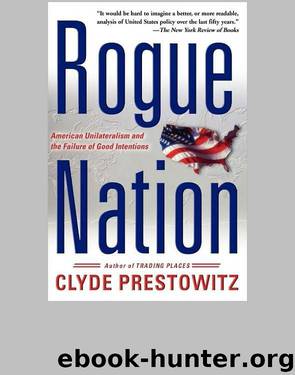Rogue Nation: American Unilateralism and the Failure of Good Intentions (2003) by Clyde Prestowitz

Author:Clyde Prestowitz
Language: eng
Format: mobi, epub
Published: 2003-11-10T15:00:00+00:00
THE ARMED ECONOMY
The third important aspect of American militarism is economic. Just as it has sought to keep key countries as quasi-client states, so the United States has sought to dominate key weapons and military technology. In 1948, U.S. defense spending was $9.1 billion, about 3.6 percent of GDP, having fallen from well over half of GDP in 1945. 43 The outbreak of the Korean War led to a quick doubling of the military budget, and during the Cold War, defense spending of about 6-7 percent of GDP became a kind of rule of thumb. Given the size of the U.S. economy this resulted in a prodigious amount of arms spending – over the entire Cold War, the equivalent of $15.8 trillion in today’s dollars. 44 This was not the unbearable burden for the U.S. economy that it would eventually prove to be for the Soviet Union. Nevertheless, there were regular outbreaks of angst over falling behind and of euphoria for the silver bullet weapons system that would make the United States invulnerable, and each of these cycles unleashed a new flood of spending.
The first panic came in 1954, when pictures of the Soviet May Day parade seemed to show a whole fleet of new Soviet bombers not derived from U.S. or British design and capable of reaching the continental United States. It was later shown that in fact the Soviets had only a few of these planes but had flown them in continuous circles over the May Day parade, making it appear that the supply was endless. At the time, however, there was great concern over the ‘bomber gap’ and powerful pressure to build more B-52s to ‘catch up with’ the Soviets. This pressure continued until the first U – 2 spy plane flights over the Soviet Union in 1956 showed that the gap was in favor of the United States. This fact did not stop presidential candidate John F. Kennedy from emphasizing, during the 1960 campaign, the need to close the dangerously widening ‘missile gap’ by creating an invulnerable retaliatory force of ICBMs to the tune of about $300 billion. 45 After Kennedy was elected it was discovered that there really wasn’t a missile gap, but that fact, too, did not stop the appropriation of billions of dollars for further expansion of U.S. missile forces. In the missile and nuclear warhead race of the 1960s and 1970s, it is impossible to say whether we or the Soviets were the generator.
A modicum of stability seemed to be established in the 1970s with the ABM Treaty and various undertakings to limit testing. But the election of Ronald Reagan as president in 1980 again unleashed the American search for invulnerability. Reagan said the doctrine of MAD (Mutual Assured Destruction) that then guided U.S. nuclear deterrence strategy was itself mad. The notion of voluntarily accepting vulnerability was just un-American, and Reagan launched the $50 billion Strategic Defense Initiative, better known as Star Wars, to develop a system capable of knocking down any missiles launched at the United States before they could arrive.
Download
Rogue Nation: American Unilateralism and the Failure of Good Intentions (2003) by Clyde Prestowitz.epub
This site does not store any files on its server. We only index and link to content provided by other sites. Please contact the content providers to delete copyright contents if any and email us, we'll remove relevant links or contents immediately.
| Elections & Political Process | Ideologies & Doctrines |
| International & World Politics | Political Science |
| Public Affairs & Policy | Specific Topics |
| United States |
The Secret History by Donna Tartt(19088)
The Social Justice Warrior Handbook by Lisa De Pasquale(12190)
Thirteen Reasons Why by Jay Asher(8910)
This Is How You Lose Her by Junot Diaz(6887)
Weapons of Math Destruction by Cathy O'Neil(6280)
Zero to One by Peter Thiel(5802)
Beartown by Fredrik Backman(5754)
The Myth of the Strong Leader by Archie Brown(5507)
The Fire Next Time by James Baldwin(5446)
How Democracies Die by Steven Levitsky & Daniel Ziblatt(5218)
Promise Me, Dad by Joe Biden(5153)
Stone's Rules by Roger Stone(5088)
A Higher Loyalty: Truth, Lies, and Leadership by James Comey(4964)
100 Deadly Skills by Clint Emerson(4925)
Rise and Kill First by Ronen Bergman(4789)
Secrecy World by Jake Bernstein(4753)
The David Icke Guide to the Global Conspiracy (and how to end it) by David Icke(4719)
The Farm by Tom Rob Smith(4511)
The Doomsday Machine by Daniel Ellsberg(4490)
